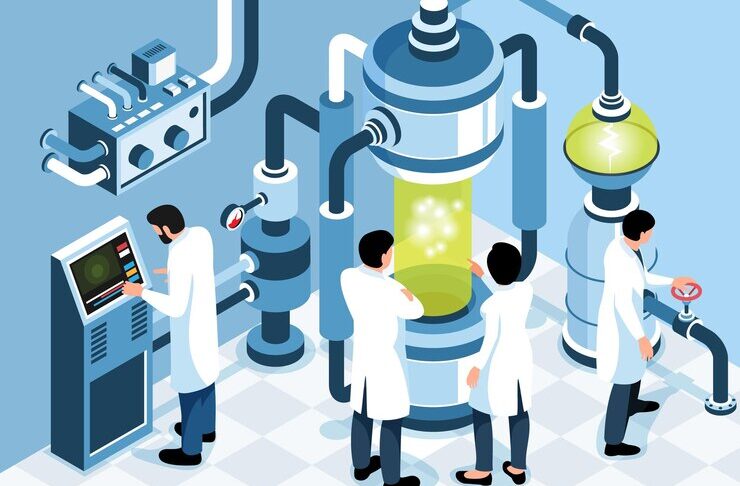
Chemical manufacturing thrives on accuracy, efficiency, and safety. However, with the continued expansion of complexity in chemical plants, there is a critical need today for integrated process systems that monitor real-time data and ensure safety. And here comes the game changer – Distributed Control System. This blog on “The Role of DCS in Chemical Plants by Enhancing Efficiency and Safety” deals with how these systems not only revolutionize the industry but provide the best control and reliability found anywhere.
What is a Distributed Control System (DCS)?
A DCS is an automated system of controlled and interconnected subsystems to keep watch over the process of the plant without any kind of interruption. Unlike traditional central control, where DCS disperses control functionality throughout different parts of the plant, it is very strong in terms of operations yet efficient.
Such a great deal of detail and control to certain processes, such as distillation, reaction, and mixing, is considered in chemical plants.
Enhancing Efficiency in Chemical Plants
The primary aim of chemical plants is to use resources in the most efficient and least wasteful manner. DCS does the following to accomplish this for them:
1. Real-Time Monitoring and Control
DCS gives operators a total view of how the plant is performing owing to its ability to draw real-time data from sensors and field devices. Parameters such as temperature, pressure, and flow rates can be monitored constantly so that the processes are in the optimum ranges.
2. Process Optimization
DCS diagnoses inefficiencies in processes through advanced algorithms and analytics and suggests adjustments accordingly. Enhancing productivity but also diminishing the consumption of energy, a key aspect for chemical plants, is one of the pivotal capabilities DCS affords to fine-tune operation.
3. Scalability and Flexibility
The systems of DCS are designed in such a way that it has the flexibility to adjust toward the changing needs of a chemical plant. Whether new equipment is in the installation process or obsolete methods are being upgraded, DCS ensures that these changes take place without interruptions while operation is in progress.
4. Automated Operations
Automation is very essential in chemical plants since most chemical plants run continuously on 24/7 schedules. DCS does this by automating repetitive tasks, ensuring consistency and leaving other jobs to humans.
How DCS Enhances Safety Standards in Chemical Plants
The chemical plants need safety. In such establishments, minor errors have serious results. DCS in the chemical plants obviously comes in the limelight here with its efficiency and the safety equipment for the following reasons:
1. Alarm Management
DCS systems include sophisticated alarm systems, which warn operators concerning deviation from the specified set value. Due to these early warnings, interventions come in time, and accidents are prevented.
2. Redundancy and Fault Tolerance
Modern DCS systems have redundancy added to their design. Redundant backups are created for critical components so that in case of failure, the operation begins by another system without any disruption and increases the quotient of safety.
3. Emergency Shutdown Systems (ESD)
A DCS emergency shutdown system component ensures instant stopping of operations during critical conditions, protecting both equipment, personnel, and the environment.
4. Data Integrity and Cybersecurity
Cybersecurity in the digital age is critical; hence, DCS systems are created with appropriate security measures in place. In this manner, sensitive data is not tampered with by unauthorized access so that the plant’s operations are not disrupted.
Key Components of DCS in Chemical Plants
To understand the role of DCS in chemical plants by enhancing efficiency and safety, it’s essential to know its key components:
- Operator Stations: Provide an easy to use interface to monitor and control processes.
- Controllers: Perform true real-time processing and actually execute control logic.
- Field Devices: Sensors, actuators and transmitters gather data and execute commands on the DCS.
- Communication Network: Ensures that data transfer between components is without errors.
- Engineering Workstations: Using for configuration and programming of the DCS.
Applications of DCS in Chemical Plants
DCS is applied to a wide range of chemical plant processes as the previous examples and also show how crucial their role is:
1. Batch Processing: Ingredient control including timing, in operation
2. Continuous Processes: Optimal operating conditions are maintained for distillation and polymerization-type processes.
3. Utilities Management: Utilities such as water, steam and power supply systems monitored and controlled
4. Quality Control: This ensures that final products meet stringent quality requirements because of the tight control on process conditions.
Why Choose DCS for Your Chemical Plant?
But investment in a DCS is definitely strategic, which pays back through efficiency, safety and long-term reliability. DCS benefits can be fully realized from any facility-be it a small plant or for large industrial establishments.
Conclusion:
In no way can the role of DCS in Chemical Plants be emphasized more than when it increases efficiency and safety. These systems actually form the very core of today’s chemical plant operations – smooth processes, high productivity, and unparalleled safety.
With the introduction of DCS to your chemical plant, you are simply making an investment in technology; actually, in future optimized and sustainable growth. As the industry goes ahead, the DCS system will top the list, from which some of the most innovative strides about chemical manufacturing excellence would evolve.


